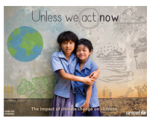Climate change is perhaps the greatest threat facing the world's children and their children, declares a report by the UN Children's Fund (UNICEF).
‘Unless We Act Now: The impact of climate change on children' cautions that climate change has the potential to undermine gains in child survival, nutrition and development and proposes concrete steps to protect children from climate-related impacts.
 November 2015: Climate change is perhaps the greatest threat facing the world’s children and their children, declares a report by the UN Children’s Fund (UNICEF). ‘Unless We Act Now: The impact of climate change on children’ cautions that climate change has the potential to undermine gains in child survival, nutrition and development and proposes concrete steps to protect children from climate-related impacts.
November 2015: Climate change is perhaps the greatest threat facing the world’s children and their children, declares a report by the UN Children’s Fund (UNICEF). ‘Unless We Act Now: The impact of climate change on children’ cautions that climate change has the potential to undermine gains in child survival, nutrition and development and proposes concrete steps to protect children from climate-related impacts.
The report combines demographic data on children around the world with scientific projections on the likely impacts of climate change to examine climate-related risks faced by children, with a special focus on the most vulnerable, and to illustrate how many children live in current and predicted climate-affected areas. The report also outlines possible scenarios for children, ranging from business-as-usual scenarios to ambitious action on tackling climate change.
Climate-induced increases in droughts, floods and severe weather will pose risks for children, including the disruption of infrastructure critical to children’s well-being such as health centers, schools and water systems and the destruction of crops and contamination of water reserves, according to the report. It emphasizes that children will “feel these effects longer than adults, making them vital in today’s decisions about climate change responses.”
The report describes how children suffer disproportionately from climate change and environmental risks. For instance, children are more vulnerable than adults to vector-borne diseases like dengue and malaria, inadequate sanitation and hygiene, and undernutrition, all of which are predicted to increase as a result of climate change. Further, the report explains that exposure to rising air pollution, food insecurity and malnutrition, vector-borne diseases and other climate-related disasters will have a detrimental impact on children’s early development.
The report recommends, inter alia: immediate, decisive action to cut greenhouse gas (GHG) emissions to limit global temperature rises to a maximum of 2 degrees Celsius above pre-industrial levels; prioritizing children’s needs in adaptation efforts; aligning work on adaptation, preparedness and disaster risk reduction (DRR) at national and sub-national levels; protecting children whose families are displaced as a result of climate change; and listening to and acting on children’s perspectives on climate change.
The report underscores the importance of tackling climate change as “an imperative for equity,” stating “climate change will harm the poorest and most vulnerable children first, hardest and longest.” It provides infographics of how children from wealthier and poorer families are predicted to respond to climate-related disasters, illustrating how cumulative effects exacerbate inequities and suggesting actions to narrow gaps between children of different income groups.[Publication: Unless We Act Now: The impact of climate change on children]